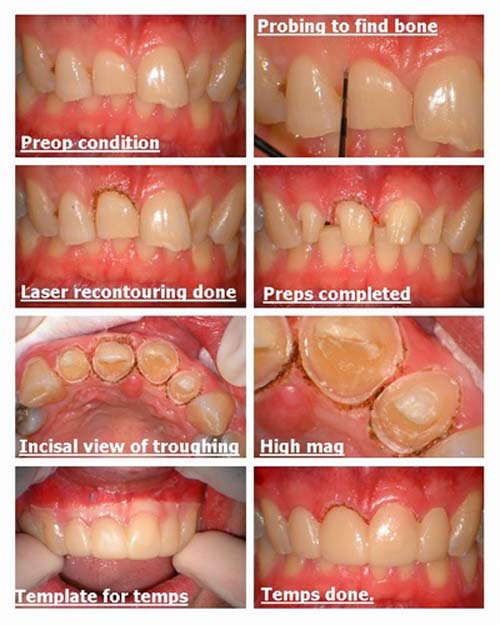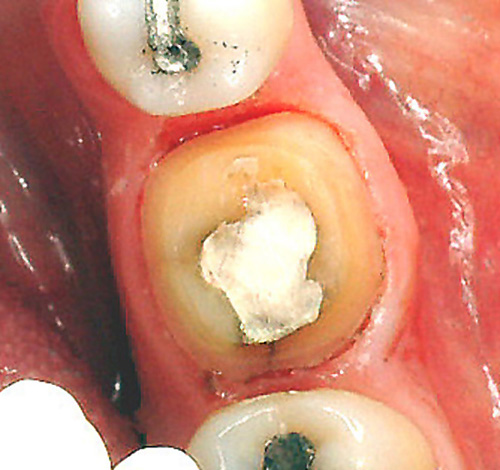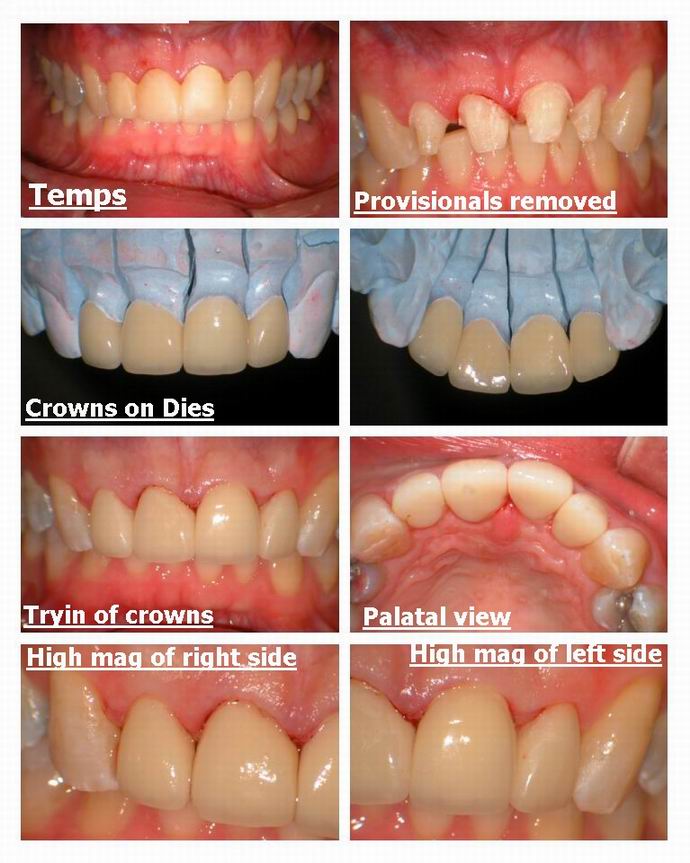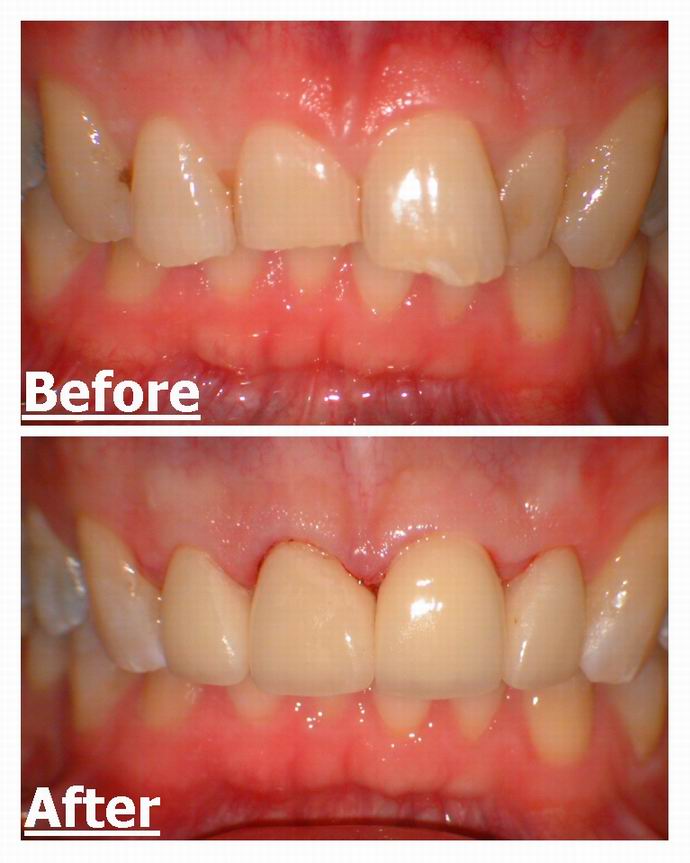Forums › Laser Treatment Tips and Techniques › Soft Tissue Procedures › Laser recontouring and troughing
- This topic is empty.
-
AuthorPosts
-
Glenn van AsSpectatorHi folks: Here is a case we did yesterday in the office. 4 anterior crowns which we prepared.
I noted that the gingival architecture on the crowns was not even on the centrals so I used the Argon at 0.9watts continuous to adjust the lengths at the gingiva and make them more even.
THen prepped the teeth and used the laser at 0.9 watts with water and air to trough for an impression.
Temps were then placed.
Just something to look at for a Friday morning.
Glenn

PatricioSpectatorGlenn,
What are the do’s and don’t for troughing on the facial? I have been a little reluctent to trough this area and risk recession and possible margin exposure where I did not want it.
Pat
Glenn van AsSpectatorHi Pat………couple of points
1. Use minimal energy possible- I use under 1 w where possible
2. Blow air or water on the site to cool it.
3. Avoid going over the same area to many times and magnifcation helps here.
4. Keep your temps slightly short to prevent pushing the tissue back
5. DOnt do on patients who are extremely picky and who have fragile , friable tissue with multiple areas of recession.Hope that helps some………I dont have all the answers but will say that a diode is better than my argon and I guess the Nd Yag will be better than both due to its fast pulse rate and allowing the tissue to relax.
Glenn
PatricioSpectatorGlenn,
Your comments make good sense. Thanks.
Pat
Robert GreggParticipantNice results Glenn–
Some people are just naturals!
Notice that Glenn left some room for the tissue to receed a little, should it need to do so. If no recession, then he can always touch it up later. That’s a good idea with CW or gated pulsed lasers.
Notice Glenn doesn’t have any epithelial peeling or coagulated tissue beyond his laser margin. That a “cool” wound.
Also, Glenn didn’t burn or char-up the tissue (black), indicating he didn’t overheat the soft tissue thus he’s not likely to get recession.
Some remarks to answer Pat:
1. Direct fiber away from soft tissue you wish to leave behind. Don’t point up into the sulcus.
2. Don’t count on water to cool–it can be deceiving like getting a sunburn on a cloudy day. 810-1064nm wavelength transmits right through water. Use air to cool. Water spray is OK, then air dry.
3. Don’t let water “pool”.
4. Watch for “tan” tissue changes indicating that the tissue is getting HOT.
5. Stop if you are seeing epithelial peeling. The tissue is too hot and will go away.Bob
Glenn van AsSpectatorAwesome points Bob………really good stuff.
I dont have all the answers but will say that for anyone looking at only a soft tissue laser. Consider the Nd Yag and also a diode.
THe Nd Yag is time tested and BObs is obviously the cats meow.
Its great to have such a knowledgeable laser user here on the forum.
Glenn
AnonymousGuestDiode Trough 1.0W CW Used the air to cool -thanks for the tip ,Bob!
My real question has to do with the fracture on the distal (that is a base on the occlusal , not amalgam -still learning to control the flash on the camera). I was able to put the finish line for the FGC cervical to where I could see the fracture end. What is the consensus for the crack- leave alone , laser etch & seal , or chase the crack?
PatricioSpectatorRon,
Absent decay in the occlusal aspect of the crack and assuming the tooth is asymptomatic I would finish as far down the crack as possible for the best possible finish line and not go looking for trouble. If trouble comes then a redo may be in order with endo etc. but in my experience these seem to work out. I feel I have successfully crowned a number of symptomatic cracked teeth eliminating the symptoms with no apparent downside. Occassionally a root canal is necessary.
Pat
Robert GreggParticipantRon-
As far as the crack goes, I would chase it a bit with the bur and the pulsed NdYAG that will be attracted to the black pigment in the crack much more than the surrounding dentin.
Even w/o the FR Nd:YAG I’d chase it a bit, then laser Er:YAG or Er: YSGG etch and bond.
Bob
P.S. Can I get upgraded from “newbie” status now? Grin;-)
whitertthSpectatori would chase the crack as well and bond and seal…use the laser on low wattage and see where it goes..i would be at 2 watts 20/20.. than bond…good luck
ps when do i leave newbie status?
AnonymousGuestAt 50 posts you will become a ‘Frequent Participant’ and eventually member and advanced member and then maybe ‘unable to miss a day of posting’. Hang in there all you’ll make it 😉
Glenn van AsSpectatorHere are the insertion photos for the case I showed at the beginning. I will have the final photos once I have this great patient back.
Case worked out quite good I think.
Do you like the format of putting these images in a collage or do you like the old fashioned ACDSee 5.0 sendpix that I used to use.
Glenn

Glenn van AsSpectatorHere is the before and after shot at 4X mag through the scope and the laser photos you saw above.
Glenn

socalsamSpectatorHi gang. as far as the crack, I would chase it to a reasonable depth. if you can eliminate it, great. if not, I would place a nice temp crown and evaluate the tooth in a few weeks.
Glen,
in your case (very nicely done by the way) why did you choose full coverage? could you have not done veneers or modified veneers instead??
Glenn van AsSpectatorHI the Sameer , great to see you posting here again.
Yes I could have done that , veneers but the breakdown on the incisal was such that I feared making a prep design that didnt overlap the lingual. The contacts on the lingual were around 1/2 to 2/3 down the palatal surface and I was worried about the contact being right on his biting surface.
Looking back veneers were an option and I just decided in this instance to go with full coverage due to his bite.
You have a good point though. Thanks
Glenn
-
AuthorPosts
